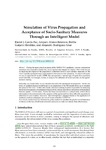Mostrar o rexistro simple do ítem
Simulation of Virus Propagation and Acceptance of Socio-Sanitary Measures Through an Intelligent Model
| dc.contributor.author | García-Paz, Daniel J. | |
| dc.contributor.author | Alonso-Betanzos, Amparo | |
| dc.contributor.author | Guijarro-Berdiñas, Bertha | |
| dc.contributor.author | Rodríguez-Arias, Alejandro | |
| dc.date.accessioned | 2023-11-09T17:32:05Z | |
| dc.date.available | 2023-11-09T17:32:05Z | |
| dc.date.issued | 2023 | |
| dc.identifier.uri | http://hdl.handle.net/2183/34134 | |
| dc.description | Cursos e Congresos , C-155 | es_ES |
| dc.description.abstract | [Abstract] During the most critical moments of the SARS-COV-2 pandemic, various containment measures were enacted to hinder the virus’s spread and mitigate its impact. This work focuses on studying the impact of the population’s adherence level to socio-sanitary measures on the virus’s spread, aiming to better understand its relevance in crisis situations. To achieve this goal, we use an agent-based model (ABM) that incorporates a special type of agent that represents social networks, for example, twitter, to analyze the influence of social networks on the agents’ decision-making. Internally, our model relies on two models that allow for simulation development. On the one hand, an epidemiological model based on an adaptation of the SIR model allows us to simulate the spread of the virus. On the other hand, a decision-making model is responsible for analyzing the levels of acceptance of containment measures by citizens and allows simulation of interactions between agents. On this basis, Twitter has been incorporated as a critical node, which allows information to be extracted about the opinions of the agents and howthese affect the population’s adherence to socio-sanitary measures. This information is obtained thanks to the application of sentiment analysis techniques on a set of tweets related to COVID-19. As a result, a useful tool was obtained for policy makers to simulate the psycho-social behaviour of citizens in the face of different restrictive measures in order to evaluate their effectiveness | es_ES |
| dc.description.sponsorship | CITIC is funded by the Xunta de Galicia through the collaboration agreement between the Consellería de Cultura, Educación, Formación Profesional e Universidades and the Galician universities for the reinforcement of the research centres of the Galician University System (CIGUS) | |
| dc.language.iso | eng | es_ES |
| dc.publisher | Universidade da Coruña, Servizo de Publicacións | es_ES |
| dc.relation.uri | https://doi.org/10.17979/spudc.000024.43 | |
| dc.rights | Attribution 4.0 International (CC BY 4.0) | es_ES |
| dc.rights.uri | https://creativecommons.org/licenses/by-nc-sa/4.0/deed.es | * |
| dc.subject | Influencia de las redes sociales | es_ES |
| dc.subject | Modelo SIR | es_ES |
| dc.subject | es_ES | |
| dc.subject | COVID-19 | es_ES |
| dc.subject | SARS-coV-2 | es_ES |
| dc.subject | SIR model | es_ES |
| dc.title | Simulation of Virus Propagation and Acceptance of Socio-Sanitary Measures Through an Intelligent Model | es_ES |
| dc.type | info:eu-repo/semantics/conferenceObject | es_ES |
| dc.rights.access | info:eu-repo/semantics/openAccess | es_ES |
| UDC.startPage | 281 | es_ES |
| UDC.endPage | 288 | es_ES |
| UDC.conferenceTitle | VI Congreso Xove TIC: impulsando el talento científico. Octubre, 2023, A Coruña | es_ES |






